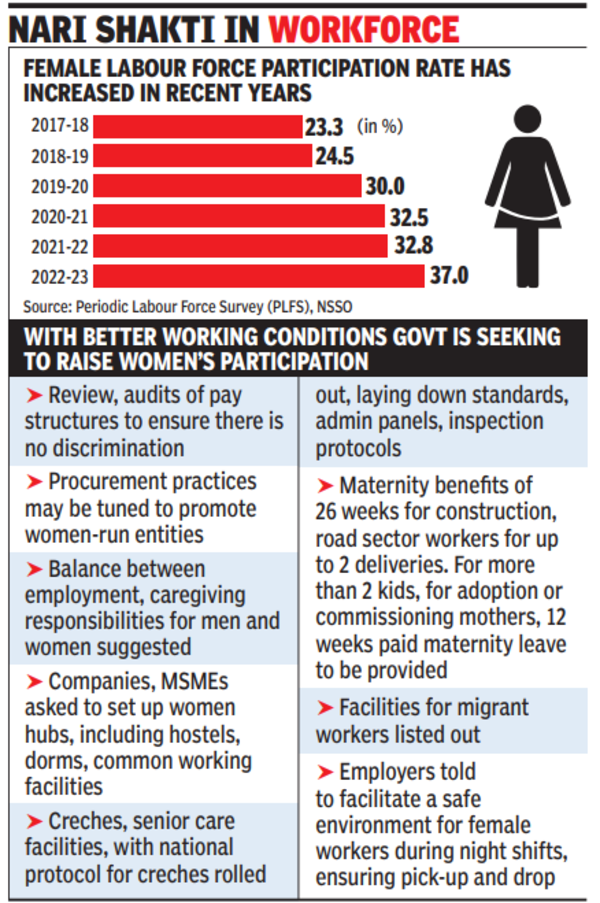NEW DELHI: In a strong push to enhance share of women in work force, the central government on Tuesday came out with a specific set of measures to provide teeth to laws which have delivered sub par results.
From gender-neutral recruitment advertisements to working women hubs with dormitories and hostels, gender-neutral creche breaks, promoting women in management and leadership roles, and providing full maternity benefits to highway and construction workers are some of the key elements of the Centre’s advisories to employers to enhance female labor force participation – an area where India lags despite recent improvements.
Companies have also been asked to review their procurement practices to promote women-run enterprises, ensure periodic review of audits of pay structures to rectify gender pay gaps.
Separately, central universities have been asked to set up working women hostels with government support, and seven have come forward with proposals and more are expected to follow soon.
Women have identified child care and other commitments at home topping the list of factors holding back their participation in the workforce, an area that the government is keen to address. While laws provide for several of the benefits, implementation on the ground has been lagging, prompting the Union ministry of women and child development to join hands with the ministries of labour, education, road transport and highways, and housing and urban affairs to ensure that protocols are in place and implemented.
After reservation for women in legislatures, the advisories seek to change the gender mix of the work force.
One of the key thrust areas was to ensure 26-week paid maternity leave to construction and highway workers apart from creches at all establishments with over 50 workers. Union women and child development minister Smriti Irani and labour minister Bhupender Yadav also released the minimum standard protocol for creches.
“The advisory that I hold in my hands for female construction workers across the country mandates them to be given 26-week of maternity leave by their employers. Now, this is nothing less than revolutionary… Now that the advisory is given, it becomes easy for the officers and the Union ministry to compute the impact of such advisories to the female construction workforce across the country,” Irani stated.
The labour ministry advisory has also sought to underline pay parity at workplace and safety and better working conditions through the internal complaints committees, including night drop facilities. In addition, the plan to set up women hubs – comprising hostels and dormitories, reduce transport time and creche and senior-care facilities – seeks to address a key issue of why women stay away from formal employment.
From gender-neutral recruitment advertisements to working women hubs with dormitories and hostels, gender-neutral creche breaks, promoting women in management and leadership roles, and providing full maternity benefits to highway and construction workers are some of the key elements of the Centre’s advisories to employers to enhance female labor force participation – an area where India lags despite recent improvements.
Companies have also been asked to review their procurement practices to promote women-run enterprises, ensure periodic review of audits of pay structures to rectify gender pay gaps.
Separately, central universities have been asked to set up working women hostels with government support, and seven have come forward with proposals and more are expected to follow soon.
Women have identified child care and other commitments at home topping the list of factors holding back their participation in the workforce, an area that the government is keen to address. While laws provide for several of the benefits, implementation on the ground has been lagging, prompting the Union ministry of women and child development to join hands with the ministries of labour, education, road transport and highways, and housing and urban affairs to ensure that protocols are in place and implemented.
After reservation for women in legislatures, the advisories seek to change the gender mix of the work force.
One of the key thrust areas was to ensure 26-week paid maternity leave to construction and highway workers apart from creches at all establishments with over 50 workers. Union women and child development minister Smriti Irani and labour minister Bhupender Yadav also released the minimum standard protocol for creches.
“The advisory that I hold in my hands for female construction workers across the country mandates them to be given 26-week of maternity leave by their employers. Now, this is nothing less than revolutionary… Now that the advisory is given, it becomes easy for the officers and the Union ministry to compute the impact of such advisories to the female construction workforce across the country,” Irani stated.
The labour ministry advisory has also sought to underline pay parity at workplace and safety and better working conditions through the internal complaints committees, including night drop facilities. In addition, the plan to set up women hubs – comprising hostels and dormitories, reduce transport time and creche and senior-care facilities – seeks to address a key issue of why women stay away from formal employment.

Yadav said the advisory focusses on making employers engaging women construction and migrant workers accountable. He said the Occupational Safety, Health, and Working Conditions Code, 2020, incorporated provisions to address some of the issues, especially for women. The four labour codes enacted by the Parliament are yet to be implemented, but the advisories seek to roll out some of the provisions.
Separately, the labour and women and child development ministries have roped in Employees Provident Fund Organisation (EPFO) to seek inputs on other steps, including rating of companies, that may be required to address the issue of low female labour force participation across the country.

